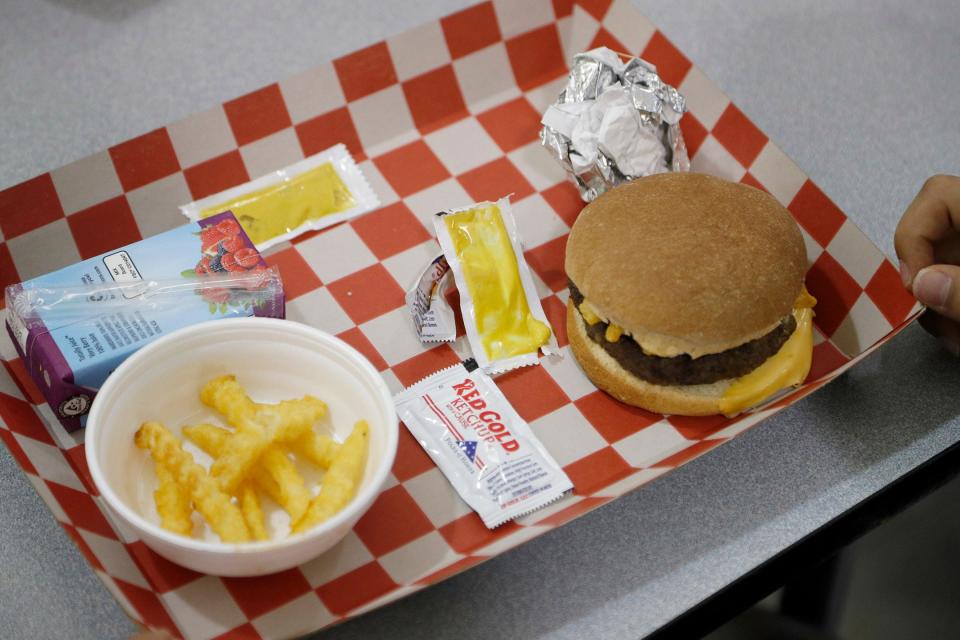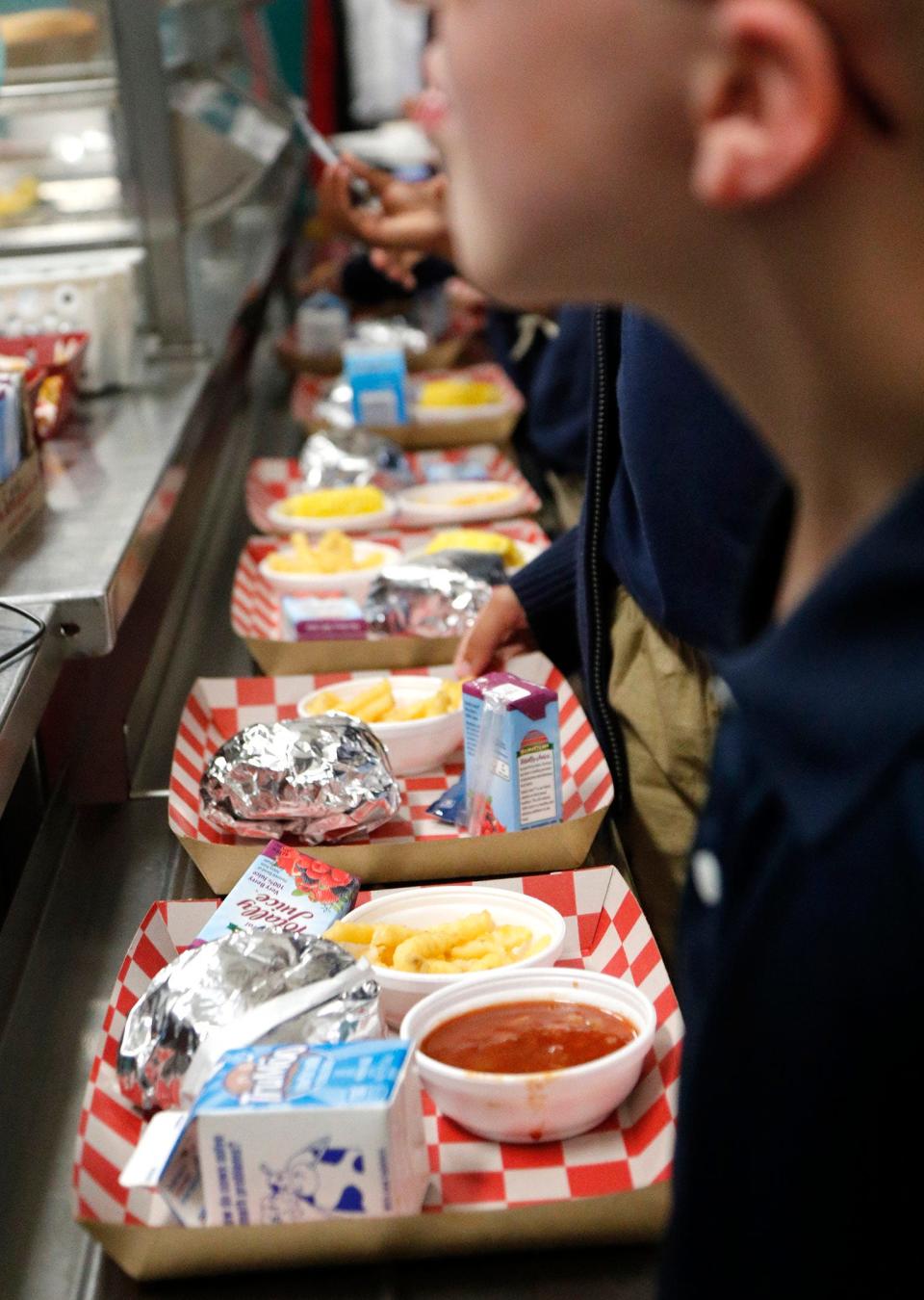Training, monitoring and inventory errors highlight Savannah-Chatham school nutrition audit
Correction: A previous version of the story listed the audit meeting for 8 a.m. Wednesday. The meeting is taking place on Tuesday and the file will be updated with information from the discussion.
A SCCPSS spokesperson clarified the meeting was moved multiple times to accommodate attendees’ schedules. While the correct updated meeting time was noted on the district’s website, the spokesperson said they do not up the Board Docs section of the website. That section is handled by the Board secretaries and was supposed to have been updated Monday.
An audit of Savannah-Chatham County Public Schools' nutrition inventory process revealed the school district largely had inventory errors and there was no formal procedure related to the district’s perpetual inventory process – a system that estimates inventory based on electronic records rather than physical.
According to a seven-page memo detailing the audit’s findings, 24% of items from a follow-up inventory audit at select schools could not be located onsite, but were documented into the Edison system, the district's cafeteria management system.
The follow up inventory audit “judgmentally sampled” 355 items across its elementary, K-8, middle and high schools, all of which largely sit in the west Chatham County area.
Recent series: As communities suffer from food insecurity, Savannah organizations offer bridge to healthy eating
Where are the grocery stores?: Nearly 14% of Chatham residents need food assistance
Audit of School Nutrition Inventory Processes by savannahnow.com on Scribd
The audit was conducted between February and June earlier this year. It included a district-wide physical audit and onsite observations of the ordering and receiving processes, according to the memo.
Additionally, school and district level nutrition staff who dealt in the areas of ordering, receiving, monitoring and inventory procedures were interviewed for the audit.
For subscribers: In West Savannah, a heavy food desert, the community steps up to meet their neighbors' needs
Also: Inflation, supply chain issues add healthy lunch hardship on Savannah-Chatham school parents
The seven-page memo detailing the findings was largely read during the audit committee meeting on Tuesday. Details of the report also come after the Savannah Morning News conducted a four-part series on food insecurity, addressing the school district’s nutrition needs for students.

The audit findings also come three weeks after the school district received a $710,000 grant to address supply chain issues.
As of June 2022, the district has spent roughly $7.5 million on food costs. According to the USDA, food costs account for 46% of a school nutrition program’s revenue. “So, it’s a good chunk of money in relation to the overall program’s revenue source,” SCCPSS’ interim director of internal audit Leah Underwood said during Tuesday’s meeting.
Food inventory process
The inventory procurement process is driven by menu planning, forecasting meal counts and inventory, according to the memo. Underwood said there isn’t a physical site to receive inventory; food is delivered directly to the schools.
Inaccurate forecasting can lead to overordering of food, causing it to be stored longer. The longer food is stored, the longer it affects cash flow and could spoil due to lack of usage and lead to theft.
More: America's Second Harvest hopes to ease struggle of rising food costs with free meals for kids
Underwood said the 76% of audited sample “was better than what we’d seen previously in the business process reviews in the fall," but emphasized there needed to be improvements in the guidance training and monitoring of the inventory process.
Training and Monitoring
Apart from the errors found during inventory, the audit process revealed improvements were greatly needed in training and monitoring.
Underwood said one of the biggest concerns the audit office had was the school nutrition program policy and procedural manual, calling much of the information incomplete or outdated.
"There were generalized statements of the process, but they didn’t go in depth," Underwood said, adding there were not step-by-step processes provided.
Adam Van Brimmer: Savannah schools superintendent spurns retirement, accepts new contract. Her legacy is TBD
Interviews with school nutrition resource mangers revealed that they did not receive training that would provide more in-depth knowledge of the relationship between meal counts, plate costs, yields and inventory, according to the memo. It went on to note that those who'd been managers for more than 10 years were last trained in that area more than a decade ago.
“We could not identify a uniform training plan for school nutrition staff," Underwood said.

The only training that had been consistently followed is the training to meet the USDA requirements of school nutrition programs. “So they were in compliance with that,” Underwood said. “I can say across the board they were all in compliance with what is required for the USDA needs in this area.”
However, while they meet USDA compliance, Underwood said there is a concern is that employees only have to do a number of hours for training and not necessarily for content.
More: School district plans to acquire Garden City gym complex, proceeds will boost new recreation
Through audit also found that school nutrition resources managers did not conduct their tasks as described in their job descriptions. They are tasked with providing local and mandated training for school site staff.

Further, the audit revealed that while weekly visits to schools sites are conducted, SCCPSS's nutrition program does not have a formal walk-through checklist for onsite reviews. Having such a tool can help document employee progress and identify training needs, Underwood said.
District 3 school board member Cornelia H. Hall said she's like to see staff training on how they treat the students they serve with kindness and respect. "Other than the bus drivers, they are also the first persons that our students see when they get to school," Hall said, "and their attitude and hospitality towards our students in those food lines is very important.”
SCCPSS Management Action Plan- School Nutrition Audit by savannahnow.com on Scribd
Recommendations
One of the key things the audit identified was developing a standard operating procedure that ensured the district was in compliance with school nutrition requirements while also increasing revenue.
Using the SOP, the audit recommends the district develop training for employees and include a trained pathway for those who want to grow and develop into other roles.
It was also recommended the district formulate a monitoring program that assess employee performance and ensured federal, state and local compliance.
More: Savannah-Chatham school board approves two-year extension to superintendent's contract
Apart from training and monitoring, the audit recommended the school district create a menu planning committee.

"We found very little input is asked of school site staff when it comes to meal planning," Underwood said. When asked if they had input about menus, school site managers who said "no" said the menu was created when it was given to them.
Those that indicated they did have input said, "they were only able to inform the employee if a meal was popular or not," Underwood said.
Adam Van Brimmer: Georgia's divisive concepts law was a political PR stunt. Schools are treating it as such.
The menu planning committee will be comprised of staff, students and parents and they will provide meal idea input, sample vendor product and test recipes.
Next steps were also outlined through a management action plan with specific steps the district will take between now and December 2023. Among the first to be implemented will be the menu planning committees, which will be implemented through the school nutrition committee.

Surveys regarding expectations of the SCCPSS's School Nutrition Program as well feedback of menu options will be sent to parents as early as October.
Residents can rewatch the meeting by visiting the school district's YouTube page or visiting its website. The 15-page audit can be read below.
School Nutrition Summary Report SY21.22 by savannahnow.com on Scribd
Raisa is a Watchdog and Investigative Reporter for The Savannah Morning News. Contact her at rhabersham@gannett.com.
This article originally appeared on Savannah Morning News: Audit: Savannah-Chatham County GA public schools have inventory errors

